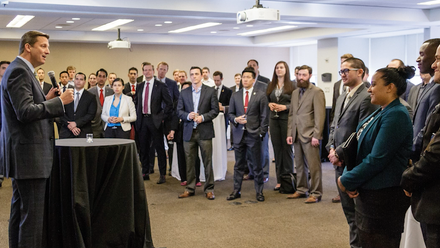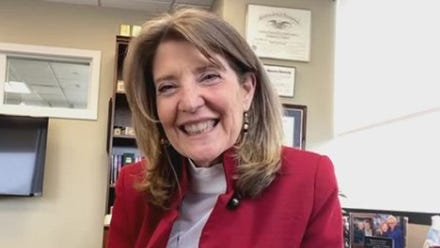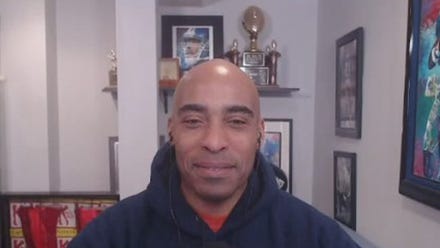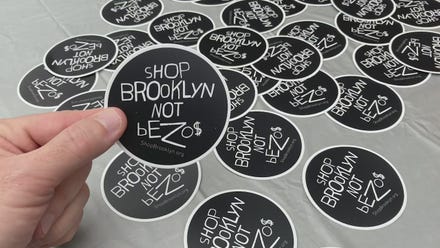
The Latest

Neil A. Carousso Joins Growing NewsNation Network

Neil A. Carousso Departing WCBS 880

Art Business Founded by Former Foster Child Speaks to the Human Experience

1010 WINS Small Business $10K Challenge: Small Business Owners Make their Pitch for $10,000

NYC’s Élan Flowers Evolves into Blooming Subscription and Corporate Services

Creating an Authentic Retail Experience Online

WCBS Business Breakfast: Growth in the Hybrid Workplace
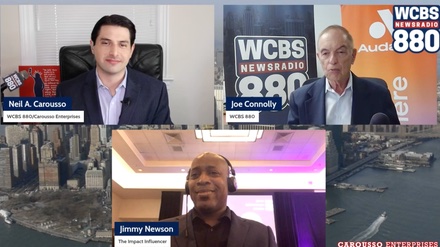
Creating a Small Business Growth Strategy
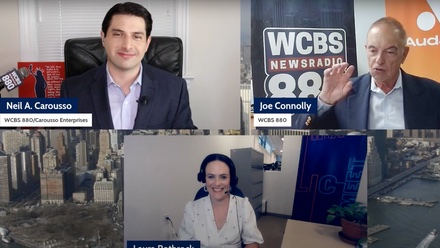
Long Island City’s Growing Business District
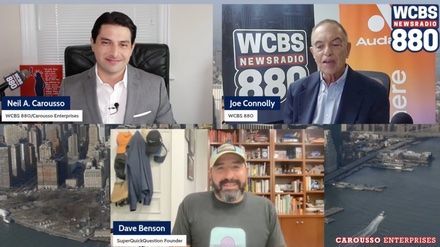
SuperQuickQuestion Creates Short and Sweet Interactions with Pro Athletes and their Fans
-
Veterans Organization Builds Remote Talent Pipeline to Fortune 500 companies
Post Views: 659By Neil A. Carousso
NEW YORK (WCBS 880) — The transition from the military to the workforce is often a challenge for veterans, but the pandemic has exacerbated that challenge. A non-profit organization based in Manhattan is taking up the task to virtually match vets and major U.S. companies.
“We’ve got some super smart people who enlist in the military and we wanted to create those pipelines for them to get into these Fortune 500 companies,” said Lt. Col. Michael Abrams, founder of FourBlock, who is currently serving in the United States Marine Corps Reserve.
FourBlock prides itself on preparing veterans for a career after service. The average salary for its national members is $92,811, according to the non-profit’s 2020 data.
“The companies that we work with are the ones who pay good salaries,” Abrams told WCBS 880’s Neil A. Carousso.
Since the pandemic hit, FourBlock pivoted from in-person networking events to virtual workshops and training on remote interviews.
Maxwell Acker-DeOliveira was looking for a job after recovering from COVID-19 in California where he was visiting family in May. FourBlock helped him prepare for remote job interviews with Deloitte in June – a process that happened rather quickly.
“I’m a social creature,” said Acker-DeOliveira, explaining Zoom meetings presented an obstacle for him to get over.
The Marine sergeant had been used to leading a six-man sniper team for five years. His deployment concluded in March 2018.
“You kind of have to push through that wall,” he said, adding, “You either network or you stay on the bench at Deloitte.”
Acker-DeOliveira was hired at the Big Four accounting firm within the month as a technology services optimization consultant.
Abrams said hiring managers understand they can trust veterans to take the initiative while working remotely.
“They’re not going to just sit around and wait to be told what to do,” he said, continuing, “They’re going to kind of figure out what needs to get done and get it done.”
Abrams emphasized it’s “trust and resiliency,” experience gained through their military service, that makes veterans attractive hires in the pandemic.
Watch the video above for more on this story.
-
Small Business Spotlight: Cindi Bigelow Shares Tips for Surging Online Sales as Retail Remains Sluggish
Post Views: 677By Joe Connolly and Neil A. Carousso
NEW YORK (WCBS 880) — It’s no surprise online sales have surpassed retail sales given pandemic restrictions, but Bigelow Tea’s third-generation president and CEO Cindi Bigelow understands exactly how to grow her fan base.
“It’s very important that you build out each page for each product with as much as you can both from a visual perspective and a verbal perspective so that you have to make that product come alive,” said Bigelow on the WCBS Small Business Spotlight, sponsored by Dime Community Bank.
She calls this the “digital shelf,” likening it to a store shelf that should capture shoppers’ attention ideally at eye level.
“We have a team of individuals that literally work on the different places that we are on the web to examine every single page to make sure that page is maximized,” Bigelow said.
She told Joe Connolly and Neil A. Carousso her world famous Bigelow Tea is very much in demand with online sales of some teas surging beyond 100 percent. But, the overall business is only up 6 percent while retail, restaurants, offices and universities are closed or limited 11 months after COVID-19 shut down large swaths of the U.S. economy.
“That’s a high hurdle to get over,” she said.
Bigelow’s manufacturing plant based in Fairfield, CT. She employs 400 workers at her family business with 300 employees in manufacturing who are required to be on-site with safety precautions in place. She expressed concern on WCBS 880 about small businesses that do not have the resources to invest in digital infrastructure.
“What about Main Street?” Bigelow asked with excitement, continuing, “Don’t you want your child to be able to work at the pizza shop down the street during their summers and being able to work at a shoe store?”
She explained she is sensitive to how local businesses have been stifled by the deadly virus and the lack of government relief, noting it could impact generations to come.
Those that are in operation, Bigelow said, need to pay close attention to consumer behavior and changing trends.
“We will listen to absolutely everybody,” she said, using a customer complaint about the lack of “peachiness” in one of her teas as an example. She noted that’s how they “identify what to do better.”
Bigelow’s motto is “the meanest taste bud wins,” meaning she will listen closely to those who offer criticisms to improve her products, which have been on store shelves for 75 years.
That’s one way she limits the echo chamber of “yes men” around her and a way to anticipate changing consumer preferences she applies to tea, but can apply to any industry.
See Joe Connolly and Neil A. Carousso’s conversation with Cindi Bigelow of Bigelow Tea on the WCBS Small Business Spotlight video above.
-
Small Business Spotlight: Industry City Draws Scores of Weekend Shoppers, Positions Retail ‘Partners’ to Succeed
Post Views: 552By Joe Connolly and Neil A. Carousso
NEW YORK (WCBS 880) — Industry City has developed the holy grail of retailing by attracting 10,000 visitors each weekend – 75 percent of pre-pandemic volume – while investing in its tenants’ recovery.
The historic complex bills itself as “Brooklyn’s vibrant creative hub along the scenic waterfront of Sunset Park,” housing 550 local shops, restaurants and manufacturers – many of which have suffered steep losses. But, Industry City’s largely open-air space has allowed them to operate safely. About 40 percent of its tenants have reopened since the shutdown.
“They can safely come, hang out, have a drink, see some music, shop at Sahadi’s, shop at Japan Village, etc. and that’s really helped them considering the environment,” Industry City Director of Development Jim Somoza said on the WCBS Small Business Spotlight, sponsored by Dime Community Bank.
The complex owns its own streets and has sprawling outdoor dining space with large tents for inclement weather.
Somoza was part of the development team of Chelsea Market, starting in 2003, before embarking on Industry City’s vision of new-age retail-tainment featuring innovative local businesses that appeal to Brooklynites and tourists alike.
He told Joe Connolly and Neil A. Carousso about several Industry City tenants, including a blacksmith that entices customers to the waterfront space.
“While they’re coming to see that, they’re also buying a drink at the Frying Pan, they are going to Standard Wormwood and Brooklyn Kura,” Somoza said, adding, “They bring people to the overall project.”
Industry City’s business plan revolves around the experience, which he describes as the “antidote to the Internet.” People are itching for an outlet and Somoza anticipates high post-pandemic demand.
“When we are doing our jobs well at I.C., we’re transporting people,” he said. “We’re taking you away.”
Shoppers can take blacksmith classes at Nazz Forge, savor chocolate as they watch it being made at Li-Lac Chocolates, and watch the Christophe Pourny Studio restore antique furniture on the other side of the glass. This connects consumers and producers on another level through an Epcot-like or Hershey Park adventure in Sunset Park, Brooklyn.
It could be the model for business communities who will need to convince hardened online shoppers to shop local and in-person.
Businesses in Industry City have been set up to recover and succeed. Somoza told WCBS 880 he likes to think of their role as a “partner” to its tenants rather than a “landlord” – a word he avoids using.
“What we do is we support them,” he explained.
At the outset of the coronavirus pandemic, Industry City offered rent breaks, changed leases to percentage rent, and helped business owners navigate the Paycheck Protection Program (PPP) loan applications and requirements.
“I think that’s a part of the reason, with one exception, every single one of our retailers has reopened,” said Somoza.
Small and mid-size businesses there feel they are nearing the finish line at the end of an arduous year, according to Somoza, who noted many are applying for the latest round of the PPP loan.
See keys for creating economic development to recover from the pandemic on the WCBS Small Business Spotlight video above.
-
Small Business Spotlight: Retired Giant Tiki Barber Extends His run with Key Business Pivots
Post Views: 650By Joe Connolly and Neil A. Carousso
NEW YORK (WCBS 880) — Retired running back Tiki Barker is elusive and quick on the gridiron and in the boardroom.
Barber played ten seasons in the NFL with the New York Football Giants. Since retiring, he has followed his passion for business in which he earned his degree from the University of Virginia.
“What I learned, obviously from my football career but also my early business career, is that relationships are invaluable,” he told Joe Connolly and Neil A. Carousso on the WCBS Small Business Spotlight.
When the market crashed in 2008, the three-time Pro Bowler had to get out of an affordable housing partnership he entered with billionaire real estate developer Stephen Ross after he retired from the league in 2006. But, the relationship he formed and maintained with The Related Companies chairman and Miami Dolphins owner led to an opportunity years down the road when Ross invested in Thuzio – the events company Barber co-founded in 2012.
“How you manage those relationships are of paramount importance for things down stream,” Barber explained.
He finds it liberating to find new ways of doing business. That realization came when Thuzio was forced to make a halftime adjustment amid the coronavirus pandemic.
It moved online and hosted private virtual business talks with celebrity speakers, including “Shark Tank” star and FUBU founder Daymond John, retired New York Jets linebacker Bart Scott and executive chef Josh Capon. Barber and his partners later changed the business model to make all virtual events free because their presenting sponsors were willing to pay a premium for more viewers.
“More importantly, you want qualified eyes,” he said, adding, “You want to know who your audience is.”
The “Tiki & Tierney” co-host told WCBS 880 they create events for their sponsors to target specific business executives and groups who are likely potential clients. For example, sports betting operator DraftKings sponsored a Thuzio virtual talk with Barber and retired New York Mets captain David Wright.
“We have this aggregation of business executives who you specifically want to talk to and we’re bringing them together over a shared passion for sports or food or wine or business information,” Barber said of Thuzio’s appeal to sponsors.
The company hosts about 35 virtual events a month, which he said would be near impossible for them to pull off in-person. Thuzio grew from eight employees to 15 in the pandemic amid rising demand for content.
Barber’s business mindset has been shaped by his mentors and experiences in the NFL. The Giants great told Connolly and Carousso he was inspired by Jon Gruden’s motivational tactics. Gruden was the head coach for the Tampa Bay Buccaneers where his twin brother Ronde Barber played cornerback and won a Super Bowl in 2002.
“We all have things that disrupt our lives,” Tiki said, noting the hardships suffered in the pandemic. “Sometimes, you have to get up and fight for yourself and fight forward for your country and as an individual. And, that’s essentially what (Gruden) was saying.”
Barber tries to portray positivity and enthusiasm among his employees, because, as Barber recalled Gruden’s message, “It’s not just for you, it’s for people who are around you.”
Football is a team sport and the ex-Giant used it as an analogy in business throughout the Small Business Spotlight conversation. Giving the play-by-play of his Giants team record 95-yard touchdown run against the Oakland Raiders on December 31, 2005, he emphasized the blocking by his teammates that catapulted him into the end zone that Saturday night.
“Understanding that it takes everyone even those who don’t show up on the big screen in order to be successful” is the mantra that guides Barber’s post-football career.
Watch Joe Connolly and Neil A. Carousso’s conversation with Tiki Barber on the Small Business Spotlight video above.
-
Small Business Spotlight: Brooklyn Startup Puts Local Stores Online
Post Views: 619By Joe Connolly and Neil A. Carousso
NEW YORK (WCBS 880) — A Brooklyn startup has made shopping local in the pandemic easier and it is helping connect small retailers with customers online.
ShopIN.nyc is “the everything store,” as founder and CEO Maya Komerov describes it, for a variety of hometown products.
“People really want to shop local, but the truth is it’s not convenient,” Komerov told Joe Connolly and Neil A. Carousso on the WCBS Small Business Spotlight.
When the pandemic hit, she saw small businesses struggling and large e-commerce companies like Amazon were thriving. Boasting the slogan “Shop Brooklyn Not Bezo$” on its merchandise, Komerov told WCBS 880 she doesn’t like to think of ShopIN.nyc as in competition with Amazon, but they are making it easier and cheaper for small businesses to sell online.
“A single store cannot provide that,” she said of e-commerce. “That’s a fact and that’s something that we need to change immediately and that’s the technology that we built to make that change.”
It is free for businesses to join and the startup pays owners within 24 hours for sales on its website.
Komerov has a background in technology. She sold her first company, Blat Lapidot Business Applications – a Salesforce partner in Israel – in 2017 before moving to New York. She went to the drawing board for ShopIN.nyc in April and launched in July. They currently support 70 stores on the site and house their products in its Brooklyn warehouse for delivery. Thirty New York City stores are waiting for approval.
“They don’t need to go and bring stuff from a warehouse in New Jersey and have all those trucks,” said Komerov, explaining ShopIN.nyc’s appeal. “We build technology to allow the stores to work in a decentralized warehouse to serve the neighbors.”
ShopIN.nyc delivers products the same day an order is placed in one box with the stores’ branding on the package. They pay delivery workers $25 an hour – higher than the $15 minimum wage in New York City.
The e-commerce startup separates itself from other online sites in that it invests in communities throughout New York, including supporting schools.
“Online shopping should be part of the community just by connecting all the stores that are already part of the community together,” said Komerov. “We build more and more tools to allow the money to come back.”
By achieving this, ShopIN.nyc is localizing e-commerce and bringing the neighborhood to the customer.
See how ShopIN.nyc is helping local businesses connect with customers on the WCBS Small Business Spotlight video above.
Social Feeds

VIDEO: Told the airline to book us on the next flight out (SPONTANEOUS TRIP!)

VIDEO: The Taylor Swift Effect | WCBS Business Breakfast

VIDEO: Future of NYC | WCBS Business Breakfast

VIDEO: Reasons for New Yorkers to be Optimistic | WCBS Business Breakfast

VIDEO: NYC's AI Chatbot | WCBS Business Breakfast


